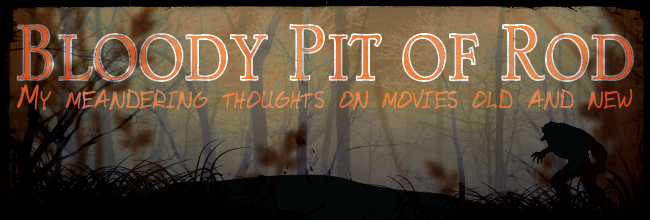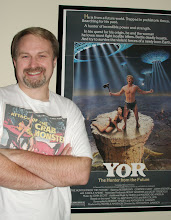
David Cronenberg's films are probably an acquired taste. I
know this because so many people speak about his movies with puzzled looks on
their faces, often saying things like "That's disgusting" or
"That's weird". The one Cronenberg film that a general audience will surely
know is his brilliant 1986 remake of The Fly and 'disgusting' and
'weird' are words that certainly fit. But few remember the subtle, restrained
film he'd made right before, called The Dead Zone. While the Stephen
King-penned story of a man able to see the future might still be labeled weird,
it's definitely not disgusting or grotesque, and is listed as one of the best
horror films of the 1980s by most genre experts. Personally, I feel Cronenberg
is one of the best adapters of prose to the big screen working today, able to
keep from forcing his own quirks into a film by virtue of always choosing
stories that are well aligned to his sensibilities in the first place. That
being said, I still prefer Cronenberg's original screenplays to his adaptations.
The movies that spring from his twisted mind always have a sense of existing on
an altered or parallel world very close to our own but with enough differences
to make it seem odd, alien and unnerving. (Maybe Canada?) His ability to find the
beauty in horror and the horror in beauty is unique in English language genre
movies, with only Frenchman Jean Rollin evoking a similar sense of unreal
'otherness'.

While Cronenberg has become a better filmmaker over the
years he had all the elements of his cinematic style in place from the
beginning. A filmmaker's early works are often a testing ground for their
later, more accomplished achievements but Cronenberg's first movies show a
talent in full flower, making strides toward bigger things from the
beginning. The Brood was his third full-length film; his recurring
themes of 'body horror' and veiled alienation are central to the story. It's a
disturbing movie that, once seen, stays with you for years. Few will deem
Cronenberg's first few movies his best, but they're still good films that bear
repeat viewing.

Frank Carveth (Art Hindle) is going through a tough time
with his family. His wife Nola (Samantha Eggar) recently had a nervous
breakdown and is in deep therapy at an experimental private clinic. Frank isn't
allowed to see Nola during her therapy but their young daughter Cindy is
encouraged to visit on weekends. The clinic she's staying in, the Somafree
Institute, is run by brilliant but controversial psychotherapist Dr. Hal
Ragland (Oliver Reed). The doctor's breakthrough therapy is a form of
psychodrama in which Ragland acts out the parts of various people in the
patient's life, so that they may be confronted and dealt with. Ragland calls
his unorthodox therapy technique "Psychoplasmics"; it seems to make
emotional problems manifest themselves physically on the patient's
body. In a staged demonstration we see Ragland help a man through a horrible
childhood memory that results in the subject's flesh breaking out in red welts.
Frank has his doubts about Somafree's methods but goes along with Nora's wishes
until he finds scratches and bruises on Cindy's back after one of her weekend
visits. He's on the verge of taking legal action to keep Cindy from her mother
when an odd dwarf-like creature appears in Nora's mother's house and kills her.
An attack on Nora's father by the same type of creature then follows this
horrible incident. Trying to discover if his wife is hurting their daughter,
Frank starts talking to ex-patients of Ragland and the information he gleans makes him begin to fear that
something has gone very wrong with his wife's therapy. After getting nowhere questioning
the doctor, he decides to take matters into his own hands.

I'll never forget reading the misleading description
of The Brood in Leonard Maltin's Movie Guide years ago.
That book gave the film its lowest rating, summing it up with a sentence that
intimated that this was one of the most despicable movies ever made. I, of
course, had to see it. The Brood remains a fascinating movie decades later. It demonstrates very well what I love about Cronenberg's work.
He is very good at setting mood and allowing the viewers to slowly immerse
themselves in the story. The otherworldliness in his films filters through
everything, so that the more carefully you slide into the tone the better the
third act feels when it kicks into high gear. It's this type of ramping up that
so many filmmakers today have abandoned in the drive to grab audiences
attention in the first 30 seconds so they won't move on to something else.
Sadly, it's Cronenberg's very strengths as a storyteller that will keep him
from being a huge success. His films require patience. Their very depth of
emotion works against their wide acceptance because there is never a clearly
defined way to feel about his characters. Most viewers of this film will expect
Reed's Dr. Ragland to be the villain but by the end he is a sympathetic
character trying as hard as possible to set things right. Also, with Frank
there comes a moment of flirtation with his daughter's teacher that makes him a
bit less sympathetic in view of his wife's situation. Cronenberg always
carefully layers his characters to make them more than just plot devices, and
that's becoming fairly rare these days. Or maybe it was always rare and I just
never noticed.






















.jpg)






























